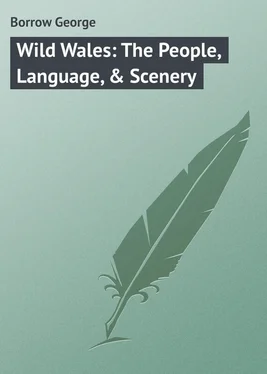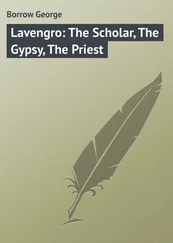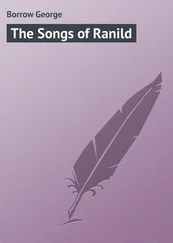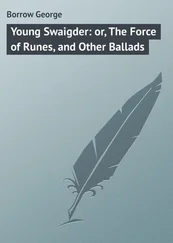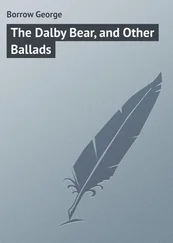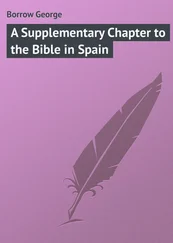George Borrow - Wild Wales - The People, Language, & Scenery
Здесь есть возможность читать онлайн «George Borrow - Wild Wales - The People, Language, & Scenery» — ознакомительный отрывок электронной книги совершенно бесплатно, а после прочтения отрывка купить полную версию. В некоторых случаях можно слушать аудио, скачать через торрент в формате fb2 и присутствует краткое содержание. Жанр: foreign_prose, Путешествия и география, на английском языке. Описание произведения, (предисловие) а так же отзывы посетителей доступны на портале библиотеки ЛибКат.
- Название:Wild Wales: The People, Language, & Scenery
- Автор:
- Жанр:
- Год:неизвестен
- ISBN:нет данных
- Рейтинг книги:5 / 5. Голосов: 1
-
Избранное:Добавить в избранное
- Отзывы:
-
Ваша оценка:
- 100
- 1
- 2
- 3
- 4
- 5
Wild Wales: The People, Language, & Scenery: краткое содержание, описание и аннотация
Предлагаем к чтению аннотацию, описание, краткое содержание или предисловие (зависит от того, что написал сам автор книги «Wild Wales: The People, Language, & Scenery»). Если вы не нашли необходимую информацию о книге — напишите в комментариях, мы постараемся отыскать её.
Wild Wales: The People, Language, & Scenery — читать онлайн ознакомительный отрывок
Ниже представлен текст книги, разбитый по страницам. Система сохранения места последней прочитанной страницы, позволяет с удобством читать онлайн бесплатно книгу «Wild Wales: The People, Language, & Scenery», без необходимости каждый раз заново искать на чём Вы остановились. Поставьте закладку, и сможете в любой момент перейти на страницу, на которой закончили чтение.
Интервал:
Закладка:
“And where would they be sent to?”
“Perhaps to Ireland,” was my answer, whereupon he started up with another Myn Diawl, expressing the greatest dread of being sent to Iwerddon.
“You ought to rejoice in your chance of going there,” said I, “Iwerddon is a beautiful country, and abounds with whiskey.”
“And the Irish?” said he.
“Hearty, jolly fellows,” said I, “if you know how to manage them, and all gentlemen.”
Here he became very violent, saying that I did not speak truth, for that he had seen plenty of Irish camping amidst the hills, that the men were half naked and the women were three parts so, and that they carried their children on their backs. He then said that he hoped somebody would speedily kill Nicholas, in order that the war might be at an end and himself not sent to Iwerddon. He then asked if I thought Cronstadt could be taken. I said I believed it could, provided the hearts of those who were sent to take it were in the right place.
“Where do you think the hearts of those are who are gone against it?” said he – speaking with great vehemence.
I made no other answer than by taking my glass and drinking.
His companion now looking at our habiliments, which were in rather a dripping condition, asked John Jones if he had come from far.
“We have been to Pont y Meibion,” said Jones, “to see the chair of Huw Morris,” adding that the Gwr Boneddig was a great admirer of the songs of the Eos Ceiriog.
He had no sooner said these words than the intoxicated militiaman started up, and striking the table with his fist, said: “I am a poor stone-cutter – this is a rainy day and I have come here to pass it in the best way I can. I am somewhat drunk, but though I am a poor stone-mason, a private in the militia, and not so sober as I should be, I can repeat more of the songs of the Eos than any man alive, however great a gentleman, however sober – more than Sir Watkin, more than Colonel Biddulph himself.”
He then began to repeat what appeared to be poetry, for I could distinguish the rhymes occasionally, though owing to his broken utterance it was impossible for me to make out the sense of the words. Feeling a great desire to know what verses of Huw Morris the intoxicated youth would repeat I took out my pocket-book and requested Jones, who was much better acquainted with Welsh pronunciation, under any circumstances, than myself, to endeavour to write down from the mouth of the young fellow any verses uppermost in his mind. Jones took the pocket-book and pencil and went to the window, followed by the young man scarcely able to support himself. Here a curious scene took place, the drinker hiccuping up verses, and Jones dotting them down, in the best manner he could, though he had evidently great difficulty to distinguish what was said to him. At last, methought, the young man said – “There they are, the verses of the Nightingale, on his death-bed.”
I took the book and read aloud the following lines beautifully descriptive of the eagerness of a Christian soul to leave its perishing tabernacle, and get to Paradise and its Creator: —
“Myn’d i’r wyl ar redeg,
I’r byd a beryi chwaneg,
I Beradwys, y ber wiw deg,
Yn Enw Duw yn union deg.”
“Do you understand those verses?” said the man on the settle, a dark swarthy fellow with an oblique kind of vision, and dressed in a pepper-and-salt coat.
“I will translate them,” said I; and forthwith put them into English – first into prose and then into rhyme, the rhymed version running thus: —
“‘Now to my rest I hurry away,
To the world which lasts for ever and aye,
To Paradise, the beautiful place,
Trusting alone in the Lord of Grace.’”
“Well,” said he of the pepper-and-salt, “if that isn’t capital I don’t know what is.”
A scene in a public-house, yes! but in a Welsh public-house. Only think of a Suffolk toper repeating the death-bed verses of a poet; surely there is a considerable difference between the Celt and the Saxon.
CHAPTER XXII
Llangollen Fair – Buyers and Sellers – The Jockey – The Greek Cap.
On the twenty-first was held Llangollen Fair. The day was dull with occasional showers. I went to see the fair about noon. It was held in and near a little square in the south-east quarter of the town, of which square the police-station is the principal feature on the side of the west, and an inn, bearing the sign of the Grapes, on the east. The fair was a little bustling fair, attended by plenty of people from the country, and from the English border, and by some who appeared to come from a greater distance than the border. A dense row of carts extended from the police-station, half across the space. These carts were filled with pigs, and had stout cord nettings drawn over them, to prevent the animals escaping. By the sides of these carts the principal business of the fair appeared to be going on – there stood the owners male and female, higgling with Llangollen men and women, who came to buy. The pigs were all small, and the price given seemed to vary from eighteen to twenty-five shillings. Those who bought pigs generally carried them away in their arms; and then there was no little diversion; dire was the screaming of the porkers, yet the purchaser invariably appeared to know how to manage his bargain, keeping the left arm round the body of the swine and with the right hand fast griping the ear – some few were led away by strings. There were some Welsh cattle, small of course, and the purchasers of these seemed to be Englishmen, tall burly fellows in general, far exceeding the Welsh in height and size.
Much business in the cattle-line did not seem, however, to be going on. Now and then a big fellow made an offer, and held out his hand for a little Pictish grazier to give it a slap – a cattle bargain being concluded by a slap of the hand – but the Welshman generally turned away, with a half-resentful exclamation. There were a few horses and ponies in a street leading into the fair from the south.
I saw none sold, however. A tall athletic figure was striding amongst them, evidently a jockey and a stranger, looking at them and occasionally asking a slight question of one or another of their proprietors, but he did not buy. He might in age be about eight-and-twenty, and about six feet and three-quarters of an inch in height; in build he was perfection itself – a better-built man I never saw. He wore a cap and a brown jockey coat, trowsers, leggings and highlows, and sported a single spur. He had whiskers – all jockeys should have whiskers – but he had what I did not like, and what no genuine jockey should have, a moustache, which looks coxcombical and Frenchified – but most things have terribly changed since I was young. Three or four hardy-looking fellows, policemen, were gliding about in their blue coats and leather hats, holding their thin walking-sticks behind them; conspicuous amongst whom was the leader, a tall lathy North Briton with a keen eye and hard features. Now if I add there was much gabbling of Welsh round about, and here and there some slight sawing of English – that in the street leading from the north there were some stalls of gingerbread and a table at which a queer-looking being with a red Greek-looking cap on his head, sold rhubarb, herbs, and phials containing the Lord knows what, and who spoke a low vulgar English dialect, – I repeat, if I add this, I think I have said all that is necessary about Llangollen Fair.
CHAPTER XXIII
An Expedition – Pont y Pandy – The Sabbath – Glendower’s Mount – Burial-place of Old – Corwen – The Deep Glen – The Grandmother – The Roadside Chapel.
I was now about to leave Llangollen, for a short time, and to set out on an expedition to Bangor, Snowdon, and one or two places in Anglesea. I had determined to make the journey on foot, in order that I might have perfect liberty of action, and enjoy the best opportunities of seeing the country. My wife and daughter were to meet me at Bangor, to which place they would repair by the railroad, and from which, after seeing some of the mountain districts, they would return to Llangollen by the way they came, where I proposed to rejoin them, returning, however, by a different way from the one I went, that I might traverse new districts. About eleven o’clock of a brilliant Sunday morning I left Llangollen, after reading the morning-service of the Church to my family. I set out on a Sunday because I was anxious to observe the general demeanour of the people, in the interior of the country, on the Sabbath.
Читать дальшеИнтервал:
Закладка:
Похожие книги на «Wild Wales: The People, Language, & Scenery»
Представляем Вашему вниманию похожие книги на «Wild Wales: The People, Language, & Scenery» списком для выбора. Мы отобрали схожую по названию и смыслу литературу в надежде предоставить читателям больше вариантов отыскать новые, интересные, ещё непрочитанные произведения.
Обсуждение, отзывы о книге «Wild Wales: The People, Language, & Scenery» и просто собственные мнения читателей. Оставьте ваши комментарии, напишите, что Вы думаете о произведении, его смысле или главных героях. Укажите что конкретно понравилось, а что нет, и почему Вы так считаете.
